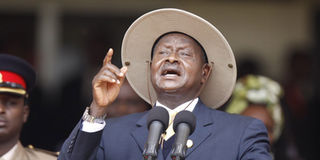Museveni is only a disruptive force in the campaign for regional peace

Ugandan president Yoweri Museveni.
What you need to know:
- President Moi was among the few Kenyans who remained sceptical of Museveni and history seems to have vindicated him.
- In the late 1980s and early 1990s, this admiration earned Museveni, alongside Meles Zenawi, Isias Aferworki, and Paul Kagame, the tag of a new breed’ of African leaders.
- In warning Dr Riak Machar that ‘you will be dealt with,’ the militaristic nature of Museveni’s approach is clear.
- Only Museveni regularly portrays this militaristic hangover in the region.
President Daniel arap Moi, in one of his off-the-cuff speeches in the 1990s, once quipped that huyo ni mjanja, referring to President Yoweri Museveni.
President Moi was among the few Kenyans who remained sceptical of Museveni and history seems to have vindicated him.
Museveni’s charm stemmed from his credentials as the man who got Uganda out of a history of political instability.
He also positioned Uganda as the alternative destination for Western capital and experimentation.
In the late 1980s and early 1990s, this admiration earned Museveni, alongside Meles Zenawi, Isias Aferworki, and Paul Kagame, the tag of a new breed’ of African leaders.
As Joe Oloka-Onyango argued, they were lauded for their youthful dynamism, a no-nonsense approach and development-mindedness.
Not only did western academics praise this new breed, (don’t mind the laboratory terminology this term implies), even Bill Clinton approached it with “irrational exuberance” that is regrettable with the advantage of hindsight.
Museveni’s good days are behind him.
He has grown into a disruptive force in regional affairs.
In the days when Uganda incubated the Rwandese Patriotic Force for the takeover of Rwanda, one could justify Museveni’s involvement on the basis of correcting a historic wrong in the Great Lakes Region.
But having done that, Museveni still extended his interference to Kenya, Rwanda, South(ern) Sudan, and the then Zaire.
In border skirmishes in Busia, Kenya, Museveni’s young militia ended up brutally wounded when Moi’s response left no doubt that he was a capable adversary.
But in other places, Museveni arrived with the gusto of the commander of the new breed of leaders; his mode of operation cast in a militaristic routine.
For instance, Ugandan support for the SPLA’s struggle for independence became more prominent during Museveni’s term.
Whatever reason he has for his latest siding with Salva Kiir, his public persona and pronouncements are no ingredient for peace in South Sudan.
His influence in the recent IGAD meeting in Nairobi worsens matters since, as Medhane Tadesse writes, the meeting was a “pure piece of Ugandan diplomacy.”
In warning Dr Riak Machar that ‘you will be dealt with,’ the militaristic nature of Museveni’s approach is clear.
The quick entry and subsequent reinforcement of Ugandan forces in South Sudan and Museveni’s presence cast a huge shadow on the feasibility of meaningful negotiation.
It is not lost on observers that Kiir shed off his regular civilian attire for military dress in a show of masculine militaristic power.
Only Museveni regularly portrays this militaristic hangover in the region.
Observers of the South Sudan think that most recent pronouncements by Kiir reflect Museveni’s thinking.
Part of the problem disrupting peace in South Sudan is suspicion by Dr Machar that Kiir might not allow for the democratic process to unfold leading to free and fair elections.
Observers confirm that Museveni has publicly advised Kiir that liberation movements do not conduct elections.
Ultimately, Museveni’s preference for force is a threat to peace in the region. Kenyan officials advising President Uhuru Kenyatta should distance themselves from him.
I am reminded of how Kofi Annan avoided Museveni’s antics on January 22, 2008.
Upon arrival in Nairobi to commence negotiations out of the post-election violence, Museveni, who had timed his arrival to coincide with Annan’s, invited Annan to State House, claiming to have a formula for ending the violence.
It was Museveni’s attempt to publicly spin a State House visit as an endorsement of Museveni as negotiator whose method required all parties to accept poll results as announced.
Mr Annan saw through the spin and avoided it completely.
We need this wisdom to avoid Museveni’s booby traps.
The author is Acting Director of the African Leadership Centre, Nairobi and Senior Research Fellow, Institute for Development Studies, University of Nairobi. ([email protected])





